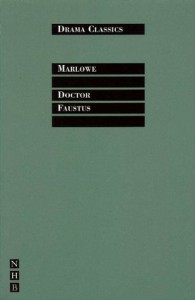I Do Repent, and Yet I Do Despair: "Doctor Faustus" by Christopher Marlowe, Simon Trussler

For me, the key to Faustus is his interaction in Act V, Scene I with the "old man". The old man gives us Marlowe's theology:
“Yet, yet, thou hast an amiable soul,”
—even after Faustus has made his deal with the devil and used the power he got for the previous 23 'years' and 364 'days', Faustus's soul is lovable. Just repent! Faustus replies:
“Where art thou, Faustus? Wretch, what hast thou done?
Damned art thou, Faustus, damned: despair and die.”
Echoing the stories of Cain after his fratricide and Jesus on the cross, Faustus insists on his damnation. The old man contradicts him:
“Oh stay, good Faustus, stay thy desperate steps.
[. . .
…] call for mercy and avoid despair.”
The old man leaves, and Faustus speaks out his dilemma:
“I do repent, and yet I do despair.”
Mephistophilis calls Faustus a "traitor", and "arrest[s his] soul / For disobedience" — don't doubt the keenness of Marlowe's irony, or sarcasm —, and Faustus repents of his repentance —irony! sarcasm! —, and gets his final wish, to see "the face that launched a thousand ships". While he's going on about how he'll "be Paris" and get Helen—does Faustus not remember how that turned out??—, during his poetry the old man returns to the stage. When Faustus leaves, intoxicated with sexual love for Helen, the old man, before defying the devils who've come to take his body to fire (but not his soul), says of Faustus:
“Accursed Faustus, miserable man,
That from thy soul exclud'st the grace of heaven,
And fliest the throne of his tribunal seat.”
Faustus doesn't crave knowledge: he goes through the catalogue of human expertise at the beginning of the play and finds, study by study, their futility, and turns to "necromantic books": "A sound magician is a demi-god."
If you're into 16th century literature, read on.
 1
1



